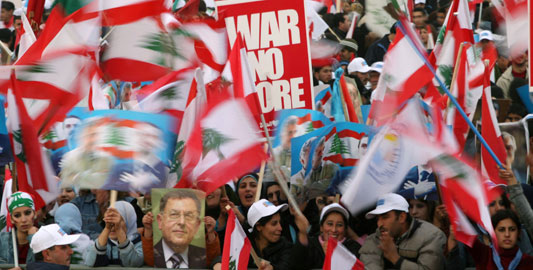A year of division and anxiety
Al Jazeera’s Zeina Khodr looks at the splits in Lebanese society after the war.

 |
| Political feuds in Lebanon have split families and friends [GALLO/GETTY] |
Zeina Khdor, Al Jazeera’s correspondent in Beirut, lived in the city through last summer’s war between Israel and Hezbollah, but it was during the aftermath that she noticed the true effects on Lebanese society.
Never before – at least since the guns fell silent in 1990 – has the threat of civil war been so real.
This time around, the division is different. It is not Muslims versus Christians, the political differences cut across sectarian lines – Sunnis versus Shias and a divided Christian community. Nowadays, sectarianism has crept into the lives of all Lebanese.
Over the past seven months – since the political crisis erupted following the resignation of five Shia ministers and a Christian ally from government – Sunni-Shia tensions have spilled out into the open.
They fought each other in fierce street battles last January and four people were killed. Some Shias living in Sunni neighbourhoods have moved out, and vice versa.
Political feuds
The political feuds have affected relationships within families and among friends.
“Every time I sit with my sister, we end up fighting because I don’t agree with her political views,” 59-year-old Ikram told Al Jazeera.
| Special report | ||||
|
Her sentiment has been echoed by many who now fear for their future. Thousands have fled the country, packing their bags looking for a better life elsewhere.
“We cannot continue living in anxiety,” 27-year-old Rima told Al Jazeera. “The security situation is bad, the political situation is deadlocked … there is no future for the new generation.”
Lebanon has been rocked by a string of bomb attacks and political assassinations. Tourists are staying away. Some businesses have closed down and employment opportunities are dwindling.
There is constitutional paralysis with the government not functioning and parliament not convening in months. The two feuding politicial factions have been unable to find a compromise after months of bickering.
The opposition, which is led by Shia Muslim Hezbollah and its general, Michel Aoun, its Christian ally, wants an increased say in government – the March 14-backed government is refusing their demand.
Struggle for power
It is a struggle for power that will have far-reaching consequences for Lebanon. The struggle is not just about seats in the national unity government, it is one that will define this country’s identity.
 |
| The army has urged the factions to reach a compromise [GALLO/GETTY] |
The opposition accuses the government of Fuad Sinoira, the prime minister, of working for the interests of the United States and “implementing Washington’s plan in the region”.
The government says the opposition is trying to bring back Syrian influence and strengthen Iran’s hand in the country. Both camps deny the accusations.
The March 14 camp wants Hezbollah to disarm. The group says it will not do that until a “strong state is in place capable of defending Lebanon”.
“Why should Hezbollah lay down its weapons,” Hassan Ahmed, a 32-year-old Shia told Al Jazeera. “They were able to defend us during the Israeli attacks. The government on the other hand was conniving with the US and Israel to get rid of us.”
“Nonsense,” Omar Shehadeh, a Sunni answered. “Hezbollah provoked Israel by kidnapping the soldiers. The state should be the only party that has arms”.
That is the debate that has been taking place across Lebanon since the end of the summer war in 2006.
Looming crisis
And yet another crisis looms.
On November 25, the tenure of Emile Lahoud, the president, who backs the opposition movement, ends. Parliament has to meet to elect a new head of state and there is a fear that those elections will not take place as scheduled due to the political crisis and disagreement between rival camps.
There could be a power vacuum or a second rival government may be announced – a dark reminder of the days of the civil war.
General Michel Suleiman, commander of the Lebanese army, has called on the feuding factions to reach a compromise, which shows the military have a real fear of being dragged into future civil conflict.
The army’s soldiers – ill-equipped and relatively untrained – are already engaged in a two-month long battle with the suspected al-Qaeda linked Fatah al-Islam group in the Palestinian refugee camp of Nahr el-Bared.
So far, Lebanon has been able to pull back from the brink. But the question on the minds of most Lebanese today is how much longer will it continue to do so.
